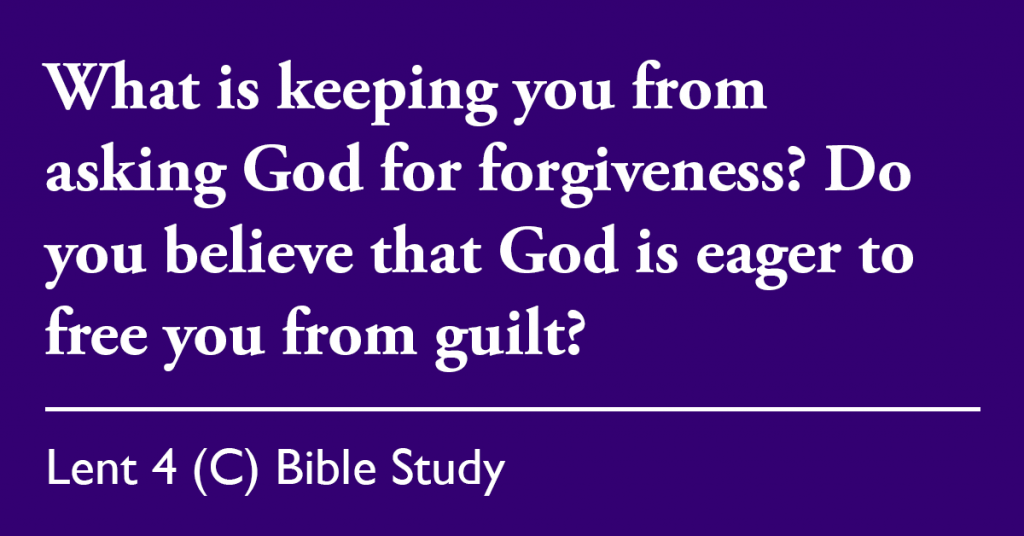This page is available in: Español
Bible Study: Lent 4 (C) – 2025
March 30, 2025
RCL: Joshua 5:9-12; Psalm 32; 2 Corinthians 5:16-21; Luke 15:1-3, 11b-32

Joshua 5:9-12
During the wilderness years following the exodus from Egypt, God sustained the Israelites with manna, a miraculous bread from heaven. This experience prepared the people to enter the land God had promised to their ancestors. Now, under the leadership of Joshua, a new generation is ready to claim that promise. The children of those who left Egypt are circumcised at Gilgal and become the holy people who will inherit the land “flowing with milk and honey,” which will now be their sustenance (Joshua 5:1-8). The people transition from bread directly from heaven to eating bread made by their own hands, which comes from the produce of the land. They are now responsible for the stewardship and production of food for themselves, even as they continue to rely on God who has given the land to them and will determine victory or defeat.
- How does the story relate to our experiences as a community sustained by God? What manna does God provide for us, and where does God give us freedom and responsibility to work in creation for our own nourishment and sustenance?
- Do you see any similarity in this story to the experience of Adam and Eve leaving the Garden of Eden (Gen. 3:23-24)? What are the differences?
- What feelings might the Israelites have experienced in transitioning from manna to bread made by their own hands from the land? How might these feelings have changed the way they related to one another, to the land, and to God?
Psalm 32
The psalmist expresses the immense feeling of freedom after confessing their sins to God. Hiding and failing to acknowledge our wrongdoing and selfishness can be physically, as well as spiritually and emotionally, damaging and painful. God is always ready to receive our prayers of confession and, in his mercy, offer a safe place of forgiveness – a refuge. God is never far from us, but we often feel isolated by our sins because of guilt and shame. We can rejoice and be glad because God’s righteousness and mercy are eternal, and God is always ready to grant forgiveness when we ask.
- What is keeping you from asking God for forgiveness? Do you believe that God is eager to free you from guilt?
- How might you express your gratitude to God for mercy and forgiveness? What does it feel like to forgive? To be forgiven? Try to put these feelings into your own words.
2 Corinthians 5:16-21
Through baptism and our continued participation in the sacramental life of the church, we are all members of Jesus Christ and so are part of God’s new creation. Paul’s word choice indicates that more than merely individuals being made new, all who are “in Christ” become part of God’s active reconciliation of the entire heavens and earth. That work of reconciliation, which is like a restoration of relationship, was accomplished by Jesus in history. It is also an ongoing process, “already and not yet,” which the members of Jesus Christ are called to continue through the power of the Holy Spirit working in and through the church. The exchange between human imperfection and God’s righteousness accomplished by Jesus is our hope for a future in which the church as the body of Christ is reconciled to God and works with God to continue that work in all creation.
- How does our vision of the world and of others change because of our baptism and location “in Christ?”
- Paul’s language of “ambassadors” calls attention to his idea that, as Christians, we live as “dual citizens,” with our primary allegiance to God as ruler of creation. What does it mean for us to live as citizens of God’s Kingdom who have a responsibility like that of an ambassador, even as we also live as citizens of earthly kingdoms?
- How does our participation in the sacramental life of the church deepen our connection to God?
Luke 15:1-3, 11b-32
Jesus reveals a key characteristic of God through this parable: God is eager for reconciliation and relationship and does not hold our failures against us. Jesus was also revealing this characteristic of God through his consistent table fellowship with people who were considered “outsiders” to those in the religious establishment of his time. In the parable, not only does the father rejoice and call for a celebration when the “lost” son returns after rudely demanding his inheritance and then squandering it, but the father also councils the elder son, who believes he has been faithful, to welcome his brother and drop his judgment and resentment, so that the two might be reconciled as well. All are in need of reconciliation with God and with one another, and God rejoices and gives of Godself extravagantly to make this possible.
- What other moments from Jesus’ life and ministry can you think of that show God’s characteristics of love, mercy, and reconciliation?
- Who do you think Jesus would eat with in our modern context that would fall outside the boundaries of religious or social convention?
- How might we show the same desire for reconciliation as Jesus and the Father in our own communities?
This page is available in: Español
Don’t forget to subscribe to the Sermons That Work podcast to hear this sermon and more on your favorite podcasting app! Recordings are released the Thursday before each liturgical date.
Receive Free Weekly Sermons That Work Resources!
This page is available in: Español


